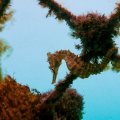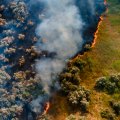The Global Change Institute at The University of Queensland will host renowned scientist and author, Professor Naomi Oreskes, on November 16 at 5.30pm, for the Brisbane leg of her Australian tour.
She will discuss her latest book Merchants of Doubt, which reveals how ideology and corporate interests, aided by a too-compliant media, have skewed public understanding of some of the most pressing issues of our era.
Professor Oreskes is famous for her landmark study of climate change research papers and her subsequent essay Beyond the Ivory Tower: The Scientific Consensus on Climate Change.
Referenced by Al Gore in his movie An Inconvenient Truth, the study found 75 percent of the nearly 1000 examined abstracts published between 1993 and 2003 either explicitly or implicitly backed the consensus view on global climate change, while none directly dissented from it.
This argument was at odds with denialist claims made in 2004 which said that the majority of scientific literature did not support evidence of global climate change.
Director of the Global Change Institute Professor Ove Hoegh-Guldberg said publications with no scientific peer-review continued to be pumped out by a few experts who appeared to gain ready access to the media.
These unqualified “experts” never had their scientific opinions properly reviewed through the standard and anonymous scientific review system, he said.
“What you hear from these individuals is usually an opinion or belief which is high on rhetoric and low on evidence,” Professor Hoegh-Guldberg said.
“These opinions rarely survive proper scientific scrutiny.
“Unfortunately, they are often confused, by the public and politicians, with genuine scientific studies published in the peer-reviewed scientific literature."
In Merchants of Doubt: How a Handful of Scientists Obscured the Truth on Issues from Tobacco Smoke to Global Warming, Professor Oreskes and Professor Erik Conway lift the lid on high-level scientists and scientific advisers with deep connections in politics and industry.
The book details how they ran effective campaigns to mislead the public and deny well-established scientific knowledge, and compares this to the current activities of climate change denialists.
“Arguments of present day climate change deniers are reminiscent of those of the tobacco companies to cancer, coal industries to acid rain and CFC manufacturers to the ozone layer,” Professor Oreskes said.
“All used the smoke screen of uncertainty and doubt to obscure the truth from the populace who became increasingly confused, frustrated and consequently over saturated and complacent.
“Undecided sceptics, who include the vast majority of the population, are swayed by the disproportionate voice and favourable message from minority climate change deniers. Many go “Dr Shopping” until they find the evidence that they want to hear.”
“You insure your house and car in case of an unforseen incident but many people do not consider the planet we all live on worthy of insurance, despite the warnings from the most qualified risk assessors,” she said.
Professor Oreskes' lecture will be held on Tuesday, 16 November at 5.30pm - 6.30pm at The University of Queensland, Abel Smith Lecture Theatre, St Lucia.
For further information, please visit: www.gci.uq.edu.au/naomi-oreskes.
Naomi Oreskes: Australian locations and dates: Sydney: Monday, 15 November, 6.00 – 8.00pm. University of New South Wales, Law Theatre (Law Building) Melbourne: Wednesday, 17 November, 5.45 – 7.00pm. Experimedia, The State Library of Victoria, 328 Swanston St, Melbourne. Adelaide: Thursday, 18 November, 6.00 – 7.30pm. The Science Exchange, 55 Exchange Place, Adelaide. Perth: Monday, 22 November, 6.00pm. University of Western Australia, Social Sciences Lecture Theatre (parking at P3 off Hackett Entrance)
Media: Robert Mackay-Wood, Communications Manager, Global Change Institute (r.mackaywood@uq.edu.au, 07 3346 9041 or 0410 491 159)
About the Global Change Institute
The Global Change Institute at UQ, Brisbane, Australia, investigates complex, interconnected, large-scale global issues in innovative ways, in order to contribute evidence-based, progressive solutions to the major problems of a rapidly-changing world.
The Global Change Institute is a vehicle for collaborative research, learning, engagement and advocacy. It seeks to partner with third-parties and achieve multi-disciplinary, integrated solutions to global change issues within the existing and projected frameworks of those problems: political, environmental, social, economic and technological.
About Naomi Oreskes
Naomi Oreskes is Professor of History and Science Studies at the University of California, San Diego.
Her research focuses on the historical development of scientific knowledge, methods, and practices in the earth and environmental sciences, and on understanding scientific consensus and dissent. In 2004 Professor Oreskes wrote an essay on science and society: Beyond the Ivory Tower: The Scientific Consensus on Climate Change.
.jpg)












